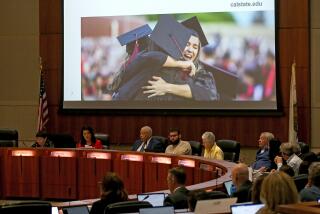Cal State students to get more say in creation and use of ‘success fees’

California State University trustees Wednesday moved to place tighter controls on controversial student fees that have drawn criticism as a backdoor way to raise tuition.
The recommendations were presented to the board by a working group led by Chancellor Timothy P. White, after the state Legislature placed a moratorium on new so-called student success fees and asked White to conduct a review.
The moratorium on additional fees will remain in place until 2016. Success fees have already been enacted at a dozen of the system’s 23 campuses and range from $162 to $830 when fully implemented. These charges come in addition to tuition, room and board.
The trustees voted unanimously to require changes in how fees are enacted, although Assembly Speaker Toni Atkins, also a trustee, abstained because she said the Legislature is likely to hold hearings on the topic.
Atkins said the new measures address many concerns, although questions remain about how to provide financial relief for low-income students who may not be able to afford the additional charges.
Many students who addressed the board at its regular meeting in Long Beach called for all fees to be repealed and for the system to consider alternative ways to fund important campus needs. Students have protested the fees on their local campuses, complaining that they were shut out of decisions and that the charges are a sneaky attempt to raise tuition.
At the trustees meeting, members of the group Students for a Quality Education chanted slogans such as “You promised us a freeze, so roll back the fees.” There were no disruptions.
Revenue from the fees has been used primarily to increase course offerings, hire faculty and advisors and expand programs that were reduced during years of state funding cuts. Some campuses have used portions of the fees for athletics programs.
Many students and others complained that the charges were unfair to those struggling financially and that they fail to honor Gov. Jerry Brown’s four-year budget deal to increase state funding for Cal State and the University of California in exchange for no tuition hikes.
Under the new policy, approval of fees will require a binding student vote — and only after the campus undertakes an education campaign to inform students about the uses, impact and costs of the proposed charges.
Increases to fees that are currently in place also will require approval from a majority of students. They will be allowed to vote on whether the fees should be rescinded, but only after those charges have been in place for six years. In addition, students must represent a majority on campus advisory committees that determine how fees will be allocated, and annual reports showing how the fees are being used must be made public.
“I believe that these recommendations put into immediate action will both protect and empower students on campuses … and provide for ongoing transparency,” White said.
The chancellor also said the system would continue to work with state lawmakers to address remaining issues.
One area that could prove sticky is the use of fees on many campuses to hire faculty, a long-term obligation that has typically been covered by state funding and tuition revenues.
Students would not be allowed to rescind the portion of the fee that’s being used to pay for new faculty.
“Students need to be made fully aware beforehand that it’s almost like a borrowing obligation so that they can make an informed decision,” said trustee Steven Glazer.
The California State Student Assn. recently approved a resolution supporting proposals similar to those before the board.
“These echo a lot of the measures we endorsed to ensure the process is student-centered,” said the group’s chairman Devon Graves, a Cal Poly Pomona senior.
The new plan also calls for any fees intended to support direct instructional activities typically paid by tuition to be approved by the chancellor after consulting with the board chair.
The success fees are not directly covered by financial aid, although students could decide to use some of their grants to pay the charges, if any money is left over, officials said.
San Diego State has a hardship clause that allows low-income students to opt out of paying the fees. President Elliot Hirshman said it is those students who often benefit most from having greater numbers of faculty and other academic support that the fees cover.
Andrea Guerra was among those who spoke of the struggles students face in paying the annual $5,472 tuition, the costs for books that can run into hundreds of dollars each semester and other mandatory campus charges that average $1,200.
The Cal State Long Beach student said she’s had to take out two loans, besides working on campus 10 hours a week, and would like to see the success fees — $346 annually at Long Beach — repealed.
“I’m already struggling,” said Guerra, 19, “and to see the fees increasing just makes me struggle more.”
carla.rivera@latimes.com
Twitter: @carlariveralat
More to Read
Start your day right
Sign up for Essential California for news, features and recommendations from the L.A. Times and beyond in your inbox six days a week.
You may occasionally receive promotional content from the Los Angeles Times.







